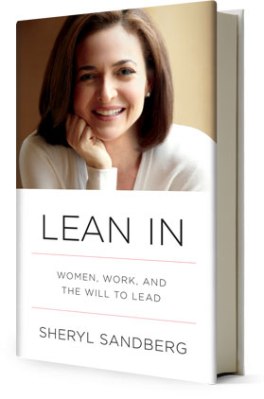Facebook COO Sheryl Sandberg‘s highly anticipated book, Lean In: Women, Work, and the Will to Lead, is already a success – and not just because it has sparked a national conversation about women in the workplace and the current state of feminism. It’s also now No. 1 on Amazon’s Best Sellers list on its first day of sales.
The conversational book, whose proceeds will go to fund LeanIn.org, a global organization focused on helping women achieve their goals, has already been met with a wide range of opinions before its launch. One argument raised against the book, which at its core is an attempt to offer an empowering message for women, has more to do with the messenger than what she’s saying – that maybe someone who’s grown up privileged and Harvard-educated isn’t the best to speak for women’s real struggles.
That argument misses the point, though.
For those unfamiliar, in Lean In Sandberg rallies women to stop holding themselves back at work. She encourages women to “lean in,” so to speak, and challenge themselves more. She wants women to not fear speaking their minds or being more aggressive. She wants women to learn to negotiate better. And, as she explained on 60 Minutes this weekend, she wants a world where little girls aren’t told that they’re “bossy,” but that they have “leadership skills.” Like she was told.
These are not bad things, and certainly are opinions based on observations Sandberg has seen first-hand on her own climb up the corporate ladder.
But like most business advice books, Sandberg’s message doesn’t apply universally, and that, say some, is part of the problem. The advice offered doesn’t address the challenges of the lower-income population, the blue-collar workers, the single moms who don’t step up to take on more projects because there’s no one else who can parent their children for them when they do.
But while that’s a real conversation worth having, it’s not one which Lean In is meant to address.
The book is arguably for those with at least some sort of support system in place, and who are thinking about their career path, not just keeping a roof over their head and food on the table. And that’s just fine. Sandberg may have a “feminist” message with Lean In, but unlike with women’s suffrage or the right to choose, it doesn’t have to be one that speaks to every woman across the U.S. to be successful. If only some portion of those at whom the book is aimed take heed, it could have a real impact by getting more of its potential audience to achieve positions of power in the workplace.
More gender parity at the top is a goal worth achieving.
But it’s only one piece of a bigger struggle. Men should receive encouragement to “lean in” at home. There’s a need for more family-friendly policies and legislation for members of both sexes, and we need to not dismiss the efforts of those who prioritize the “life” part of the “work/life” balance, whether moms or dads.
At the end of the day, Lean In may be how this new, and long overdue, conversation starts, but it’s not where it will end.
